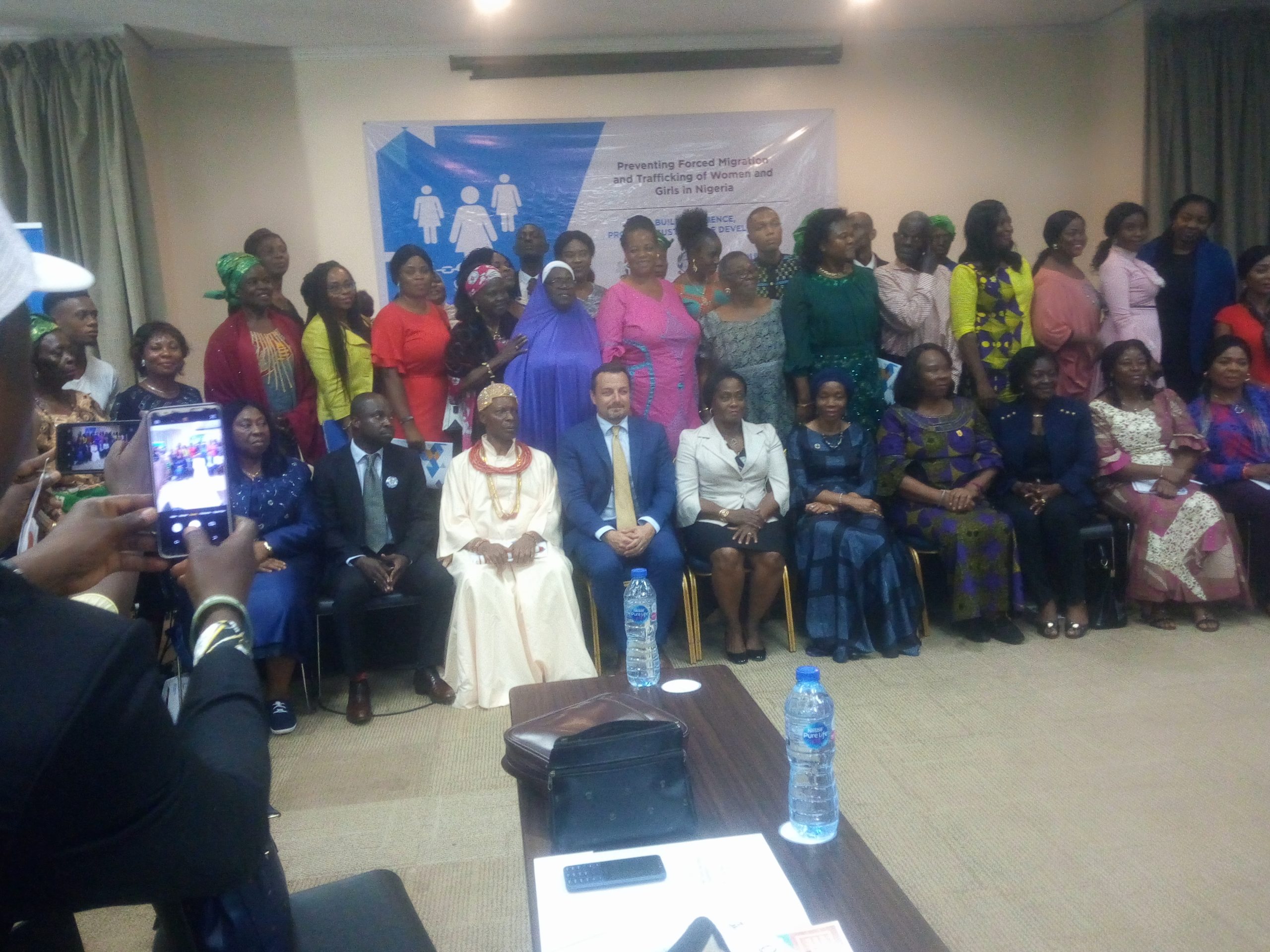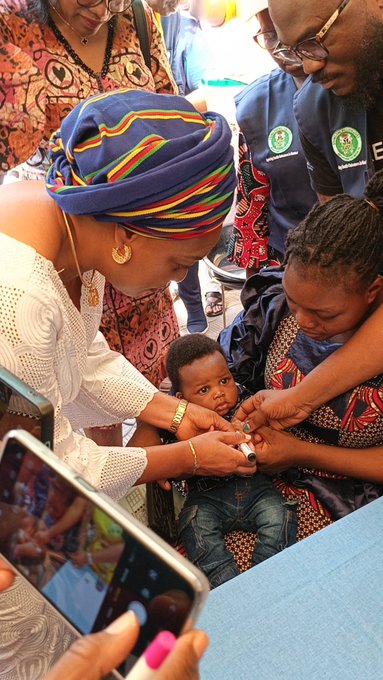Health
Trafficking: UN Women To Collaborate With Nigeria Governments In Curbing Menace
Published
6 years agoon
By
Editor
Based on need for gender-responsiveness interventions to address forced migration and trafficking, United Nations (UN) Women in collaboration with the governments of Nigeria and Italy is implementing a pilot intervention in Edo and Lagos states, with a potential of upscaling to other parts of the country.

A cross section of panel discussants at the launching
Comfort Lamptey, UN Women coordinator disclosed this in Benin City at the formal launching of the Project on ‘Preventing Forced Migration and Trafficking of Women & Girls in Nigeria.’
She said the project launched was to both recognise and build on the efforts of the Nigerian government in addressing trafficking and irregular migration, promising to build on mechanisms and structures set up at state level, including the Edo State Taskforce Against Human Trafficking and NGO Taskforce on Trafficking.
“The project being launched today both recognizes and builds on the efforts of the Nigerian government to address trafficking and irregular migration. Here in Edo State, it will build on mechanisms and structures set up at the State level, including the Edo State Taskforce Against Human Trafficking and the NGO Taskforce on Trafficking.

Participants at the launching
“Nigeria presents itself simultaneously as country of origin, transit and destination for all streams of migration and trafficking. Beyond irregular migration, Nigeria also experiences significant trafficking”, she added.
According to the Coordinator, UN Women is working to support government of Nigeria’s developmental and humanitarian priorities and frameworks, adding that these are anchored in the Sustainable Development Goals (SDGs).
She further said the Goals hold that states collective interest and the most vulnerable people and populations are not left behind by economic, social and environmental progress.
“Out of the 17 SDGs, trafficking in persons is specifically mentioned in three targets under three goals: Goal 5 (Gender Equality), 8 (Decent Work and Economic Growth) and 16 (Peace Justice and Strong Institutions).The project we are launching today is therefore situated within broader efforts to support accelerated progress and realization of the SDGs”, she added.

- Panel of discussants at the launching
Lamptey lamented that women and children constitute majority of those trafficked to Europe as well as being irregular migrants to other African destinations and the Middle East, adding that such irregular migration is being facilitated through agents, family acquaintances, etc.
She noted, “Women and children constitute the majority of those trafficked to Europe, as well as being irregular migrants to other African destinations and the Middle East. While there are dynamic shifts over time, the main sites of forced documented and undocumented migration and trafficking include Edo State, the Delta and some Northern states.
“As most of you know, the trafficking and irregular migration of women and girls in Nigeria is facilitated either formally through agents, or informally through family and acquaintances. Criminal gangs and networks operating are also increasingly involved in trafficking.
“Women and girls are primarily working in or trafficked into sectors like domestic work, the sex sector and farms, which further exposes them to a range of other violations, including various forms of gender-based violence.”
Lamptey further lamented that in spite of efforts being made by government and individual bodies, potential for women’s organizations to support efforts aimed at preventing and addressing the effects of forced migration and trafficking remain under-utilized.
You may like
Health
LASG FLags Off Polio Outbreak Response Campaign
Published
6 months agoon
January 20, 2025By
Editor
The Lagos State Government, through the Lagos State Primary Health Care Board, has launched the 2025 Polio Outbreak Response Campaign, reaffirming its commitment to eradicating polio and safeguarding the health of its children.
The ceremony, held at the Simpson Primary Healthcare Centre, was led by the First Lady of Lagos State, Dr. (Mrs.) Claudiana Ibijoke Sanwo-Olu, represented by Mrs. Widad Jumoke Mustafa, a member of the Committee of Wives of Lagos State Officials (COWLSO).
In her address, the First Lady emphasised the state government’s proactive measures to keep Lagos polio-free, highlighting the critical importance of the campaign in preventing the debilitating effects of poliomyelitis, which can result in paralysis or death.
READ ALSO: IMPEACHMENT: Lagos Ex-Speaker, Obasa’s ‘Sins’ Revealed
The First Lady also called on parents, community leaders, and stakeholders to support the campaign by ensuring eligible children are vaccinated.
Targeting children aged 0-59 months, vaccination teams will administer the Oral Polio Vaccine (OPV) to prevent virus transmission.
Dr. Kemi Ogunyemi, the Special Adviser on Health, expressed gratitude to Lagosians for their continued cooperation in the fight against polio. While appreciating all healthcare workers and partners for their services, Mrs. Ogunyemi encouraged parents to present their children and wards for the exercise.
Also speaking, the Chairman of Lagos Mainland Local Government, Mrs. Omolola Rashidat Essien opined that Immunization is key in ensuring that children are kept safe from polio and other vaccine preventable diseases.
Dr. Abimbola Bowale, the Supervising Permanent Secretary, Lagos State Primary Health Care Board, who also spoke at the event, underscored the life-saving importance of immunization.
“All children aged 0-59 months need multiple doses of the polio vaccine to ensure full protection. Any child missed represents a potential risk for the poliovirus to spread. The vaccine is safe, effective, and crucial in keeping our communities polio-free,” he stated.
Dr. Bowale also outlined several strategies to ensure the success of the campaign, including fixed post teams stationed at primary healthcare centres and public health facilities, house-to-house visits, and a transit strategy to reach special locations such as places of worship, schools, motor parks, and other public venues.
The event concluded with Dr. (Mrs.) Claudiana Ibijoke Sanwo-Olu officially launched the campaign, marking a renewed effort to maintain Lagos State’s polio-free status.

The Lagos state suspected cholera cases have risen to 421.
The Commissioner for Health, Akin Abayomi disclosed this on his Instagram handle @profakinabayomi on Saturday.
“As of June 20, 2024, an additional four suspected cholera cases have been reported, as illustrated in the accompanying graph,” he wrote.
He noted that the Emergency Operations Centre in collaboration with all relevant partners is actively engaged in contact tracing, community-based surveillance, awareness campaigns, sample testing, and ensuring that confirmed cholera cases receive appropriate medical treatment.
READ ALSO: Two Suspects Arrested For Stealing Car From Mosque During Juma’at Prayer
On Friday, the commissioner confirmed 35 cases out of the 417 suspected cases and 24 deaths across 20 Local Government Areas in the state.
The cases were reported from Agege, Badagry, Ikeja, Mushin, Ajeromi-Ifelofun, Epe, Ikorodu, Ojo, Alimosho, and Eti-Osa.
Others were Kosofe, Oshodi-Isolo, Amuwo-Odofin, Ibeju-Lekki, Lagos Island, Shomolu, Apapa, Ifako-Ijaiye, Lagos mainland, and Surulere.
Cholera is a food and water-borne disease caused by ingesting the bacteria— Vibrio cholerae — in contaminated water and food. Cholera can cause severe acute watery diarrhoea, and the severe forms of the disease can kill within hours if left untreated.
In Nigeria, cholera is an endemic and seasonal disease, occurring annually mostly during the rainy season and more frequently in areas with poor sanitation.
READ ALSO: Police Arrest 28yr Old Suspected Cultists, Recover Gun In Delta Community
The World Health Organisation on Thursday announced a spike in cholera in several regions of the world, with almost 195,000 cases and over 1,900 deaths reported in 24 countries since the start of 2024.
WHO said the Eastern Mediterranean Region reported the highest number of cases, followed by the African Region, the Region of the Americas, the Southeast Asia Region, and the European Region.
The global health body, however, noted that there are no reported cases in the Western Region, according to its bulletin released on Wednesday.
It said it exhausted its global stockpile of Oral Cholera Vaccines by March but was able to exceed “the emergency target of five million doses in early June for the first time in 2024.”

By Silver Yeibake
Autism, commonly known as Autism Spectrum Disorder (ASD), is a neurodevelopmental disorder that affects communication, social interaction, and behavior. Autism is referred to as a spectrum condition since it can manifest in a variety of symptoms and abilities. While the actual cause of autism is unknown, evidence suggests that genetic and environmental factors interact to influence its development.
The risk factors include a sibling with autism, advanced age of parents, exposure to certain air pollutants and pesticides before birth, extreme prematurity, mothers with diabetes, immune system disorders or obesity, any difficulty with delivery leading to deprivation of oxygen to the baby’s brain, fever during pregnancy, lack of certain vitamins minerals during pregnancy, and certain genetic conditions, such as Down, fragile X, and Rett syndromes.
“Risk factors can not on their own cause a disease. However, they can increase the likelihood of that disease in a person.”
It is important to know that contrary to trending claims online, there is no scientific or medical evidence that vaccines or consumption of sugar are risk factors for autism.
READ ALSO: Kidney Stones: What You Need To Know
Autism is defined by difficulties in social interaction and communication. Individuals with autism may struggle to grasp social cues, maintain eye contact, and engage in typical back-and-forth conversations. Some people may also engage in meaningless, repetitive actions, such as hand-flapping or rocking, and have strong interests in specific areas.
It is essential to remember that autism is a lifelong diagnosis, but with early intervention and adequate care, people with autism can live fulfilling lives.
Autism treatment frequently includes behavioral therapy, speech therapy, occupational therapy, and social skills training. Each individual with autism is unique, thus interventions should be tailored to meet their personal needs and strengths.
In spite of the difficulties that autism can cause, many people with autism possess unique talents and abilities. Some people may succeed in fields such as music, art, mathematics, or programming, thus it is important for society to acknowledge and honor the qualities and achievements of people with autism.
In summary, autism is a complicated and diverse disorder that affects individuals in various ways. By raising autism knowledge, understanding, and acceptance, we can build a more inclusive society in which people with autism can thrive and attain their full potential.
Dr. Yeibake, Weriwoyingipre Silver.
Senior Registrar,
Faculty Of Pediatrics,
WACP
- Anglican Church Bans Partisan Speeches By Politicians During Services
- Woman Dies After Falling Into 170-ft Well
- Bank Fraud: Court Orders Forfeiture Of Cash, Properties
- Court Orders Lagos LG To Vacate Deeper Life Church Land
- Court Sentences Two To Death For Ritual Killing In Ogun
- Four Sentenced To Death For Killing Driver In Bayelsa
- Bayelsa Poly Workers Protest Withheld June Salaries
- Lagos LG Poll: Why We Did Not Shut Border – Immigration
- Nigerian Man Jailed In US For $1.3m COVID-19 Fraud
- FG Secures 44 Fresh Convictions On Terrorism Financing
About Us
Trending

 Metro3 days ago
Metro3 days agoMysterious Bird Found Inside Auchi Poly Lecturer’s Office, Killed

 News5 days ago
News5 days agoBREAKING: FG Officially Releases Age Limit For Admission Into Tertiary Institutions

 News5 days ago
News5 days agoOPINION: APC’s Leprosy Versus ADC’s Scabies

 Politics4 days ago
Politics4 days ago‘The Man I Defeated 32 Years Ago Hasn’t Forgiven Me’ – Ita-Giwa Laments Discrimination Against Women In Politics

 Metro1 day ago
Metro1 day agoJUST IN: Psychiatric Hospital Staff Shot Dead In Benin

 Politics4 days ago
Politics4 days ago97 Lawyers Line Up To Defend ADC, Mark, Aregbesola Against APC’s ‘Fake Lawsuit’

 News2 days ago
News2 days ago‘I Feel Your Pain’ – Ighodalo Reacts To S’Court Verdict On Edo Guber Election

 News4 days ago
News4 days agoSyncope Or Fainting: What You Need To Know

 Headline4 days ago
Headline4 days agoFull List: 3 African Countries Ranked Among World’s Best Countries

 Metro14 hours ago
Metro14 hours agoMy Husband Grabs, Squeezes My Breasts Any Time He Wants Sex — Wife



















